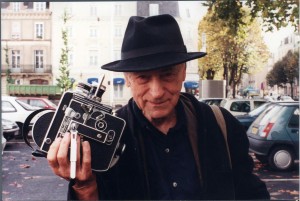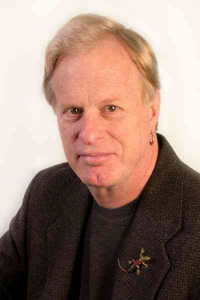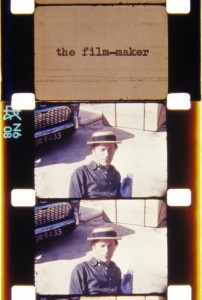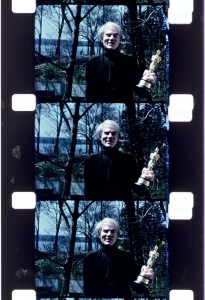
Cinema Pacific’s Schnitzer Cinema, our monthly series at the JSMA, has devoted this year to the history of American Experimental Media. The series has been building towards the arrival of two special attractions — the Schnitzer Museum installation of Frozen Film Frames: Portraits of Filmmakers by Jonas Mekas and two talks during the Cinema Pacific film festival by Scott MacDonald, the leading explicator of American avant-garde film.
Scott MacDonal d is the nation’s leading scholar and explicator of avant-garde film. He is author of the on-going series, A Critical Cinema: Interviews with Independent Filmmakers, now in five volumes from University of California Press; of three books on institutions that have been crucial for independent cinema: Cinema 16 (Temple University Press), Art in Cinema (Temple), and Canyon Cinema (California); and of two books of essays: Avant-Garde Film/Motion Studies (Cambridge) and The Garden in the Machine: A Field Guide to Independent Films about Place (California). Adventures of Perception (California), a collection of essays and interviews, several of which have an eco-cinema focus, was published in 2009. In recent years he has taught film history at Hamilton College, Colgate University, and Harvard University.
d is the nation’s leading scholar and explicator of avant-garde film. He is author of the on-going series, A Critical Cinema: Interviews with Independent Filmmakers, now in five volumes from University of California Press; of three books on institutions that have been crucial for independent cinema: Cinema 16 (Temple University Press), Art in Cinema (Temple), and Canyon Cinema (California); and of two books of essays: Avant-Garde Film/Motion Studies (Cambridge) and The Garden in the Machine: A Field Guide to Independent Films about Place (California). Adventures of Perception (California), a collection of essays and interviews, several of which have an eco-cinema focus, was published in 2009. In recent years he has taught film history at Hamilton College, Colgate University, and Harvard University.
EXHIBITION
Frozen Film Frames: Portraits of Filmmakers by Jonas Mekas
Schnitzer Museum 
April 1 – June 7, 2015
22 of Mekas’ portraits of filmmakers have been provided by the artist and the Deborah Colton Gallery for this special exhibition, presented in collaboration with the Cinema Pacific Film Festival. Among the subjects are Pier Paolo Pasolini, Elia Kazan, Robert Frank, Wim Wenders, Andy Warhol, and John Lennon and Yoko Ono, observed filming their experimental film “Bottoms.” Accompanying the 22 photographs in the Artists’ Project Space will be Jonas Mekas’ 1997 feature film, Birth of a Nation, which consists of 170 portraits, sketches, and glimpses of independent film makers and activists shot between 1955 and 1996.
Jonas Mekas is considered by many to be the “godfather of American avant-garde film.” He is revered for his experimental diary films, his founding of the New York film institutions, Filmmakers Cooperative and Anthology Film Archives, and his passionate promotion of avant-garde cinema when he was a film critic for The Village Voice. At 92 years old, he has, in recent years, opened up a new career as a gallery artist, exhibiting photographic blowups of adjoining frames from his 16mm film diaries.
Mekas was born in 1922 in Semeniskiai, Lithuania. In 1949 he emigrated to the U.S. together with his brother, settling in New York. He has been one of the leading figures of American avant-garde filmmaking playing various roles: in 1954 he founded Film Culture magazine; in 1958 began writing his “Movie Journal” column for The Village Voice; in 1962 co-founded the Film-Makers’ Cooperative (FMC) and in 1964 the Film-makers’ Cinematheque, which eventually grew into Anthology Film Archives. His own output varies from narrative films (Guns of the Trees, 1961) to documentaries (The Brig, 1963) and to “diaries” such as Walden (1969), Lost, Lost, Lost (1975) and As I was Moving Ahead, and Occasionally I Saw Brief Glimpses of Beauty (2001). His films have been screened extensively at festivals and museums around the world. Among his many awards are a Guggenheim Fellowship in 1966; the Creative Arts Award in 1977; Mel Novikoff Award at San Francisco Film Festival, 1992; Chevalier de l’Ordre des Arts et des Lettres from Ministry of Culture, France in 1992 and 2000; Lithuanian National Award, 1995; Special Tribute, New York Film Critics Circle Awards in 1996. In 2013, Mekas participated in an extensive presentation of his works at Serpentine Gallery, London and the Centre Pompidou in Paris. Other recent exhibition venues include the State Hermitage Museum in Saint Petersburg, Russia and the Cinémathèque Royale in Brussels, Belgium.
Screenings
 April 15: Jonas Mekas Program I: Film Portraits
April 15: Jonas Mekas Program I: Film Portraits
With gallerist Deborah Colton and Skype with Jonas Mekas. Scenes from the Life of Andy Warhol (1982, 36 min.) chronicles not only Warhol, but also the social and cultural excitement that swirled around him. Zefiro Torna or Scenes from the Life of George Maciunas (1992, 35 min.) is comprised of diary footage of Maciunas from the mid-’50s until his tragically early passing in the mid-’70s, bits of Fluxus events, and performances, and is a beautiful portrait of a lost friend and living spirit.
April 29: Jonas Mekas Program 2: Walden (Part One)
Experimental film critic and teacher Scott MacDonald hosts tonight’s program. Walden was Mekas’ first diary film, and it was edited as a collection of images gathered between the years 1964 and 1969. Its original title was Diaries, Notes, and Sketches. The sketches in Walden refer to various films that, edited previously, were later included in Walden: Report from Millbrook (1965/1966), Hare Krishna (1966), Notes on the Circus (1966), and more.
April 30: Avant-Gardens: Landscape in Experimental Film
Scott MacDonald will screen and discuss four extraordinary films: Eaux D’Artifice (Kenneth Anger, 15 min.), Fog Line (Larry Gottheim, 11 min.), Time and Tide (Peter Hutton, 35 min.), and Impromptu (Rose Lowder, 8 min.). McDonald will show how these and other avant-garde films explore and challenge the modes by which people interact with and perceive landscapes, creating opportunities for fresh insight and more meaningful engagement with the environment. Cosponsored with Cinema Studies and Landscape Architecture.